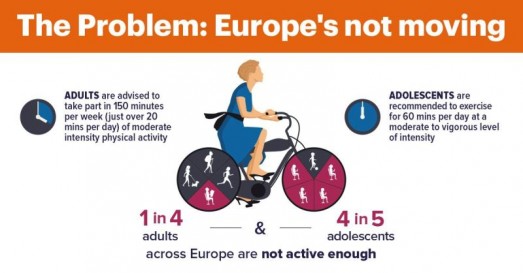Let's get Europe moving
16/06/2015

By Mogens Kirkeby, ISCA President
Within a few decades, physical inactivity has become one of the leading risks to European citizens' well-being and a growing challenge for European economies. But despite increasing evidence of dramatic health and economic costs associated with physical inactivity, we still lack sufficient initiatives to reverse this negative trend.
Every citizen wants to be healthy and every government aspires to provide a healthy living environment for its citizens. Ensuring citizens' well-being was also fundamental to the foundation of the European Union, as the first objective of its constitution indicates: The Union's aim is to promote peace, its values and the well- being of its peoples.
From this perspective, our citizens, governments and the European Union all share the same objective. But they are not always on the same page when it comes to recognising the threat inactivity poses to our well- being, or how to tackle it. Each year, half a million Europeans are dying from non-communicable diseases linked to being physically inactive (e.g. type 2 diabetes, heart disease and some cancers) and the economic cost of this inactivity is 80.4 billion Euros per year.
The numbers present a clear message: The inactivity time bomb is ticking and we need to defuse it!
From a moral point of view we need to act now. We cannot let half a million fellow citizens die when a simple and cheap "medicine" is right in front of us. From a purely economic perspective we need to update our model of promoting physical activity for our health and well-being. It is not clever business to waste 80 billion Euros when a good part of it could be saved through simple interventions and lifestyle changes. ISCA is dedicated to increasing the uptake of physical activity not only in Europe, but worldwide - that is because we believe that all citizens have the right to enjoy the physical, mental and social benefits of a physically active lifestyle. However, physical activity promotion relies on a multi-sector approach and on effective initiatives that can assist communities and individual citizens in engaging in a more active lifestyle.
Governmental institutions, the corporate sector and civil society all have important roles to play in getting Europe Moving. They have many opportunities to contribute through single sector initiatives or by engaging in more efficient cross-sector partnerships. It is up to us to try them. The only thing that will not work is sitting on our hands.
At ISCA, one opportunity we have grasped to create these cross-sector partnerships, assist civil society organisations in establishing initiatives that support active lifestyles, and push physical activity higher on national and European political agendas is a campaign. NowWeMOVE is a combined mobilisation and awareness campaign and last year its flagship event, MOVE Week, showcased more than 5,600 community sport events across Europe in the same week, engaging one million citizens. A good start and we welcome anyone who wants to join in and help boost these positive numbers.
We strongly believe it is time to respond to and act on our knowledge of physical inactivity as a pressing social issue in Europe. It is high time to defuse the inactivity time bomb.
This article was originally published in the Europe's World journal Summer 2015 edition (#30)
The full report "The Economic Cost of Physical Inactivity" can be found at
http://inactivity-time-bomb.nowwemove.com/
Posted on 16/06/2015 by Mogens Kirkeby, ISCA President

